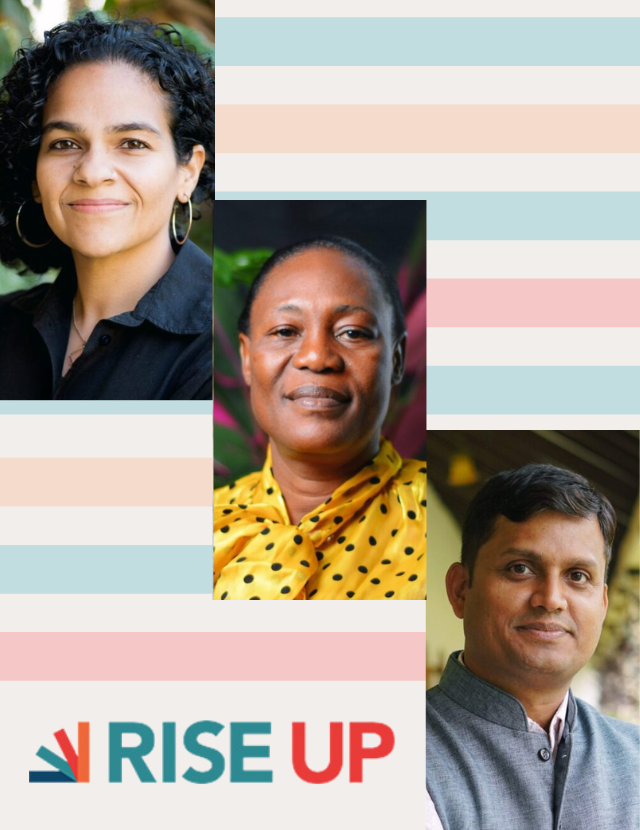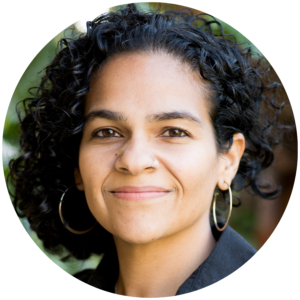Three Rise Up Leaders Addressing Environmental Challenges Affecting Women and Girls
Program
Highlights

PHI's Rise Up empowers local leaders to achieve equity in education, health and economic opportunity. Meet Neha, Anastesia, and Prem, three Rise Up Leaders addressing environmental challenges affecting women and girls.
15K+ displaced families received birthing kits and midwifery services
20K villages with small, marginal, women farmers will have improved water access
2M farmers will have doubled the income with improved water access
1M+ residents potentially protected by strengthened gender-sensitive emergency response policies
-
Focus Areas
Capacity Building & Leadership, Global Health, Women, Youth & Children -
Issues
Climate Change -
Expertise
Leadership Development
PHI’s Rise Up partners with women, girls and allies who are reshaping their communities and nations as part of a worldwide movement for justice and equity. Rise Up empowers these local leaders to achieve equity in education, health and economic opportunity.
Learn how Rise Up Leaders are addressing environmental challenges affecting women and girls, recognizing that meaningful progress in gender equity inherently strengthens resilience in climate solutions:
Meet Rise Up Leader Neha Mankani
When floods swept through Pakistan in 2022, Rise Up Leader Neha Mankani didn’t launch a new climate initiative–she drew on her midwifery expertise to meet an urgent, lifesaving need. Named one of BBC’s 100 Women for her critical work, Neha delivered birthing kits and midwifery services to over 15,000 displaced families, demonstrating what Rise Up Leaders around the world already know: advancing gender justice requires us all to address the climate challenges that disproportionately affect women and girls.

My recognition of climate impacts as a core element of gender justice stems directly from my experiences on the ground. During the devastating floods in Pakistan in 2022, the disproportionate impact on women, girls, and gender-diverse individuals was stark and horrifying. We witnessed firsthand the emergence of deeply concerning issues like ‘climate brides,’ a surge in gender-based violence, and a complete breakdown of essential sexual and reproductive health and rights services and support systems. As a midwife in a climate-affected coastal community, I see daily how environmental degradation creates unique challenges for women. Water scarcity forces women to undertake arduous journeys, their limited mobility intensifies vulnerability to extreme heat, and changing weather patterns impact the fishing industry–their primary livelihood–contributing to nutritional deficiencies and heightened risks of gender-based violence.Neha Mankani
Rise Up Leader, Pakistan
Climate change hits women and girls the hardest. Drought reduces crop yields, creating economic insecurity for women in rural communities; floods damage or shut schools down completely, with adolescent girls more likely to drop out of school entirely as a result; and extreme weather displaces families, increasing vulnerability to gender-based violence, disrupting access to menstrual hygiene products, and cutting off critical maternal health care for pregnant and postpartum women.
Here’s what’s important: with growing frequency, we’re seeing that Rise Up Leaders’ work to advance gender equity and justice in health, education, and economic opportunity requires them to address climate-related challenges by necessity, not by design. Rather than treating gender and climate as separate issues requiring distinct expertise, Rise Up Leaders demonstrate the power of community-based solutions that intersectionally address both.
Meet Rise Up Leader Anastesia Ezeolisa
In Nigeria, Rise Up Leader Anastesia Ezeolisa is advocating for legislation to protect women and girls in Anambra state from annual flooding, with a particular focus on supporting those who are most severely impacted.

Women are often left out of flood preparedness and response planning, meaning their needs such as reproductive health services and gender-separated shelters are often overlooked. This heightens the risk of sexual and gender-based violence (SGBV), especially for adolescent girls and single women.Anastesia Ezeolisa
Rise Up Leader, Nigeria
With Rise Up’s funding, coaching and support, Anastesia’s advocacy will strengthen the state’s implementation of gender-sensitive emergency response policies, with the potential to protect more than 1 million residents and ensure sustainable economic recovery for affected women and girls. This systemic change will foster resilience, bridge gender gaps, and empower the most vulnerable communities in Anambra State.
Meet Rise Up Leader Prem Shankar
With training and funding from Rise Up, Prem Shankar is advocating for a state irrigation policy in Jharkhand, India, where recurring droughts threaten agricultural livelihoods. Limited irrigation infrastructure and climate uncertainty have created a cycle of poverty that particularly impacts women farmers.

Gender equity and environmental sustainability must go hand in hand because these issues are deeply interconnected parts of a larger fight for justice and dignity. In communities across Jharkhand and beyond, we see this connection every day. When a drought hits, it’s the women who walk farther for water. When forests are degraded, it’s the women who lose access to firewood, food and livelihoods. And when climate shocks force migration, women and girls are often left behind – with more responsibilities but fewer resources. When we center women in our environmental work, change becomes transformational.Prem Shankar
Rise Up Leader, India
Prem’s systemic approach is expected to improve water access for small, marginal, and women farmers across 20,000 villages, potentially doubling the income of 2 million farmers and creating sustainable agricultural resilience in the face of increasing climate unpredictability. Prem aims to have the policy adopted by October of this year.
Climate and gender aren’t separate issues–they’re inextricably linked. Rise Up Leaders like Neha, Anastesia, and Prem demonstrate the transformative power of solutions that address both issues, recognizing that meaningful progress in gender equity inherently strengthens resilience in climate solutions. By investing in local leaders who understand these intersections, we’re building more resilient, equitable communities capable of withstanding increasing climate threats around the world.
A version of this impact story first appeared in Rise Up’s newsletter and on their website.
Work With Us
You change the world. We do the rest. Explore fiscal sponsorship at PHI.
Support Us
Together, we can accelerate our response to public health’s most critical issues.
Find Employment
Begin your career at the Public Health Institute.
